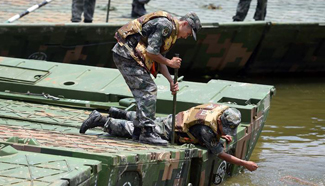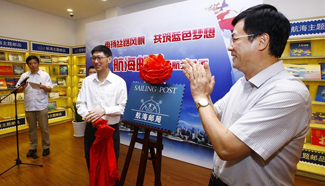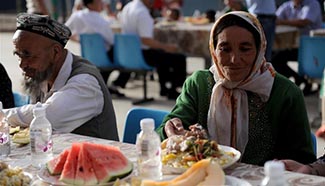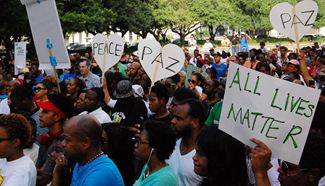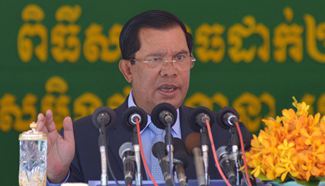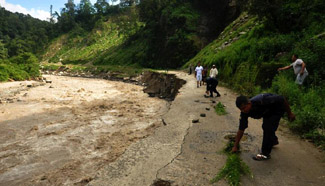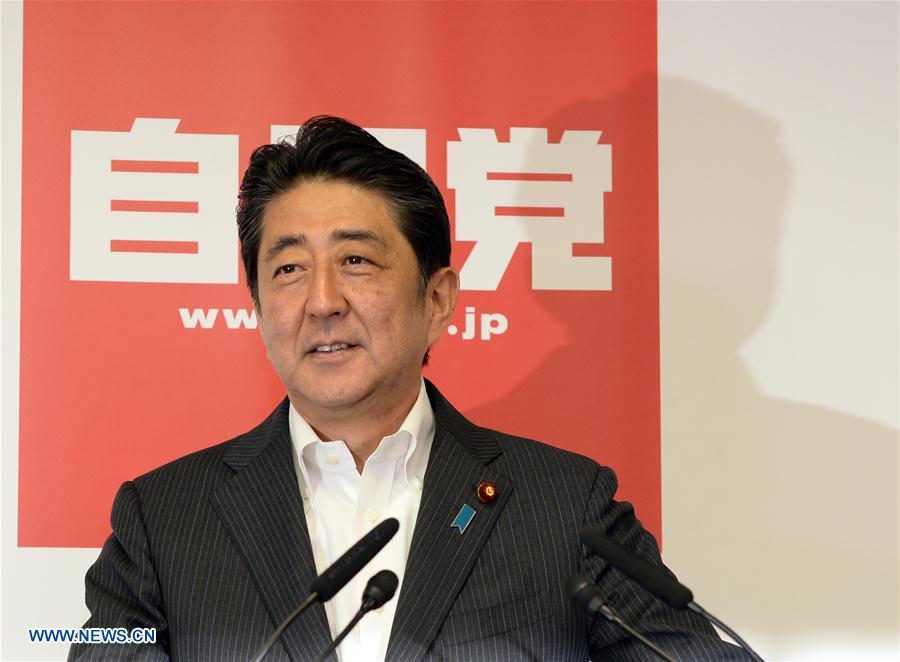
TOKYO, July 11, 2016 (Xinhua) --Japanese Prime Minister and leader of the Liberal Democratic PartyShinzo Abespeaks during a press conference in Tokyo, capital of Japan, July 11, 2016. Shinzo Abe held the press conference after his ruling coalition retained the majority of the parliament's upper house in the recent election. (Xinhua/Ma Ping)
by Jon Day
TOKYO, July 11 (Xinhua) -- Following a widely anticipated win for Japanese Prime Minister Shinzo Abe's ruling Liberal Democratic Party-led (LDP) coalition in Sunday's upper house election, the prime minister has tightened his grip on power by wooing the electorate with dubious pledges of economic salvation, but in fact bringing his goal of constitutional amendment closer to actualization.
The prime minister, during the run-up to the election, had campaigned for his party on a platform of economic pledges that played on the electorate's fledgling hopes that their leader might finally be able to institute fundamental economic changes to kickstart what has been a perpetually sluggish economy since he came to power. In the absence of any real opposition with tangible alternatives, the election proved a mere formality for Abe and his LDP-bloc.
"Japanese voters were not really given much of an option when it came to casting their ballots on Sunday. For the longest time they've heard the 'Abenomics' mantra and while it hasn't delivered the results they had hoped for, or indeed those that were promised, to abandon Abe and his plans now may have seemed foolish," political analyst Teruhisa Muramatsu told Xinhua Monday.
"In essence Abe was saying he needed more time for his rejigged economic policies to take effect and downplayed his intentions to amend the constitution, hedging that the Japanese public really had no choice in the matter and would rather vote for the chance of economic improvement rather than against the constitutional issue that has been massively muted and even refuted by senior party officials," Muramatsu said.
He went on to explain that to call the Japanese public ignorant when it came to political affairs would be overly simplistic, but to say that the public would always prioritize the hope for economic success above all else would be closer to the truth. This had been evident when Abe and the LDP retook power in 2012 on the back of pledges to revitalize the economy, albeit widely known that the LDP and Abe in particular have always sought to revise the constitution.
The prime minister, despite his suppressed tone on constitutional amendment, has previously been more vocal about the matter, stating publicly that his party had held the revision as inherent to its policy even going as far as to draft its revision, and that he himself saw it as a personal dream to revise Article 9 of the pacifist constitution, which forever renounces war, prohibits Japan from using force as a means of settling international disputes and bans Japan from maintaining war potential.
But through a series of strategic if not cunning political maneuvers since he retook office, such as the formation of a National Security Council, enactment of the controversial and highly-unpopular official secrets law, and the forcing of security laws through the parliament which has paved the way for the increased operational scope of the Self-Defense Forces, Abe is now on the cusp of engineering the biggest security shift since the end of WWII.
"The prime minister now has the two-thirds majority he needs in both chambers of parliament following the upper house election result on Sunday, the majority of whom are in favor of constitutional reform, to hold a public referendum on the matter," Asian affairs commentator Kaoru Imori explained.
"The first point will play on the public's intention to 'do the right thing' when in fact the bills changing the SDF's dynamic were forced through the Diet in the first place after being reinterpreted unilaterally by Abe's Cabinet and against the majority of public opinion, and on the second, when security issues get hyped up by the government, a sense of unfounded paranoia and something akin to nationalism seems to prevail and Abe and his administration will certainly take advantage of this as preliminary discussions on the contentious amendment have already been tabled," Imori said.
The expert maintained, however, that the current trajectory of the Abe administration was a monumental mistake, the consequences of which, as was the case during and after WWII, could be felt for generations as a "remilitarized Japan with borderless ambitions" could only serve to see the nation dragged into conflicts it has avoided for the past 70 years and the safety the island nation has enjoyed thrown into jeopardy.
Describing the political climate under Abe and the LDP as both neo-nationalistic and neo-militaristic, with "Abenomics" as an enduring smokescreen aimed at shielding the leader's true intentions from the public and the wider international community, Imori suggested that a future under such new militarism would see the nation launched unwillingly into a new, unknown era of domestic, regional and international insecurity.
"If Japan further aligns itself militarily alongside the United States and other allies, then this will have profound ramifications on the country. Up until now, with the exception of isolated incidents overseas, Japan has not been specifically targeted by overseas extremist groups on home soil such as the so-called Islamic State, for example, but this could certainly change if in twine with the U.S., Japanese forces increase their activities in certain Middle Eastern or even African countries," Imori said.
Muramatsu concurred, stating that a referendum on amending Article 9 was in fact a vote on the very nature of the future of security in Japan, and the public should be made fully aware of that before it goes to the polls.
"We've seen recently that public referendums don't always go as planned with those that voted 'Leave' in the recent vote in Britain to exit the European Union, not fully aware of the facts before they voted and swayed by a convincing 'Leave' campaign that have since seen all of the key architects resign from their posts, or retreat from their assumed responsibilities in guiding the tricky exit negotiations henceforth," Muramatsu said.
"If security threats are hyped up in this region, the public will need to question the reality of events ahead of a possible referendum as well as the consequences to stability in the region if they vote to move away from pacifism. In addition, they will need to educate themselves on foreign affairs, something the apathetic electorate is not known for. If the referendum goes the way Abe has designed it, the Japanese government will be held fully accountable for its actions overseas, through reprisals carried out on military personnel and citizens living overseas, as well as on Japanese soil," he warned.
Whether now or in ten year's time, Japan is fully unprepared to be in the crosshairs of militant groups and diplomatically and economically would be better off with healthier regional relationships. The Japanese people still have a chance to stand up for what they have savored over the past seventy years. Peace. "It's not too late," concluded Muramatsu.





